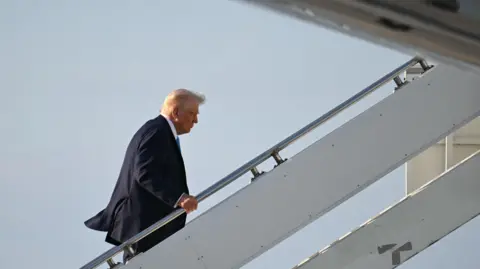EU tariffs 'pretty soon' but UK can be worked out - Trump
 Getty Images
Getty ImagesUS President Donald Trump has hinted the European Union (EU) could be next to face tariffs, after he slapped 25% levies on goods from Mexico and Canada along with an additional 10% tax on imports from China.
While arriving into Maryland from Florida, Trump told the BBC that tariffs on EU goods imported into the US could happen "pretty soon".
"They don't take our cars, they don't take our farm products, they take almost nothing and we take everything from them. Millions of cars, tremendous amounts of food and farm products," he told journalists.
The US President added he enjoyed good relations with British Prime Minister Sir Keir Starmer, and that trade issues with the UK could be worked out.
When asked by the BBC if there was a timeline for announcing tariffs on the EU, Trump said: "I wouldn't say there's a timeline, but it's going to be pretty soon."
For its part, the 27-member bloc has condemned Trump's decision to move ahead with tariffs against Canada, Mexico and China, and warned that it will "respond firmly" if it also becomes a target.
Mexico and Canada have vowed to take retaliatory measures, while China said it could take "corresponding counter measures".
On trade with the UK, the US President said the country has been "out of line" but added that the issues could be resolved.
"The UK is out of line. But I'm sure that one, I think that one, can be worked out," Trump said.
The US President also discussed his relationship with the British Prime Minister who he said has been "very nice".
"We've had a couple of meetings. We've had numerous phone calls. We're getting along very well," he added.
Tariffs are taxes charged on goods imported from other countries. The charges are seen as a tool to protect domestic industries from foreign competition.
Increasing the price of imported goods is aimed at encouraging consumers to buy cheaper domestic products instead to help boost their own economy's growth.
Most tariffs are set as a percentage of the value of the goods and in general the importer pays it.
But given countries often respond to tariffs by matching measures of their own, businesses and consumers in both countries can be impacted.
Trump is threatening to impose tariffs on goods imported from the EU to the US to address his country's long-standing trade deficit with the bloc, which occurs when a country imports more than it exports.
Some 20 EU member states exported more to the US than they imported in 2023, according to Eurostat. The country with the largest surplus was Germany, driven by car and machinery exports, followed by Italy and Ireland.
Trump has repeatedly complained about the EU's car exports to the US, with fewer vehicles being shipped the other way.
Last week, British business secretary, Jonathan Reynolds, told the BBC that the UK should be exempt from any tariffs, noting that the US does not have a goods trade deficit with the UK.
Following Trump's comments, the London's FTSE 100 stock index of the UK's biggest publicly-listed companies tumbled more than 1% on opening.
Shares in some of the biggest European carmakers also slumped following concerns over potential import duties to the US.
Volkswagen, BMW, Porsche, Volvo Cars, Stellantis, and truckmaker Daimler Truck all fell between around 5% and 6%. French car parts supplier Valeo slumped 8%.
"We believe around 8 billion euros ($8.18 billion) of VW's revenues are impacted by tariffs and around 16 billion euros of Stellantis revenues," analysts at investment bank Stifel wrote in a note.
The prospect of higher taxes being introduced on imports to the US is concerning many world leaders, because it will make it more difficult for companies to sell goods in the world's largest economy.
But tariffs are a central part of Trump's economic policy. He sees them as a way of growing the US economy, protecting jobs and raising tax revenue.
